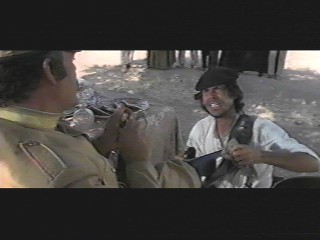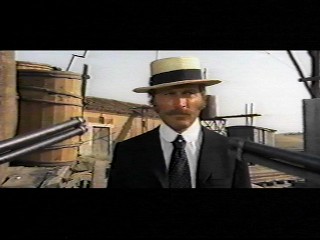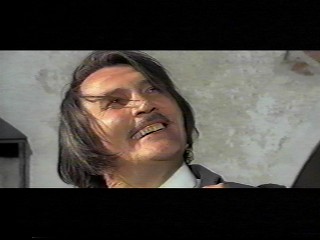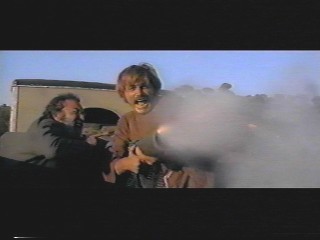
|
|
|
|
|
|
|
|
|
|
|
|
|
(1971) Director: Sergio
Corbucci
One thing that's always puzzled me is the attitude most American film critics of the late '60s/early '70s had towards the spaghetti western. Though a few of them championed Sergio Leone's entries in this genre, even those particular movies got a lot of heat from the rest of those reviewers. Their attitude seemed to be immediately dismissive of any of these efforts, an attitude that still exists in part from some quarters (such as from idiots like author Brian Garfield.) I can understand the criticism that many spaghetti westerns had thin and/or unoriginal storylines and often bad dubbing, but I find it hard to understand why these critics wouldn't even acknowledge things like good production values, or gritty moods that honestly showed that the real west wasn't clean and polished, and that many of the so-called heroes in the west weren't as perfect as we want to think. And let's not forget the music; what Ennio Morricone started with the scoring of A Fistful Of Dollars resulted in the formation of a musical genre that's had unbelievable influence, and remains as fresh and powerful today as when those notes first came out. In trying to figure out this hostility coming from those
critics, a few possible theories come forward. It could have been
because they were from an older generation who grew up with more
clean-cut westerns, and they were all of a sudden being confronted with
the unsavoury proposal Like many other politically-minded spaghetti westerns, this one takes place during the Mexican revolution, right in the middle of its most chaotic and unorganized period. The revolutionary events in this movie (told almost completely in flashback) all started with Basco (Milian, recently appearing in Traffic), a grimy peasant little better than a punk, who is just one of the many commoners under the thumb of the fascist government. Still, he clearly takes guff from no one, and blind with rage one day, he engages in a stupid and suicidal impulsive act that ordinarily would have gotten him killed - but since it occurs at just the right time, minutes later he finds himself a lieutenant in the revolutionary forces of a General Mongo. Finding that his new role brings him respect and various fringe benefits, it's obvious that from now on he will do what it takes to stay in such a prestigious position. Not long afterwards, a mysterious European arms
merchant by the name of Yolof Peterson (Nero, of Django
fame) enters the scene, ostensibly to make a deal Compaņeros was not the first or the last spaghetti western to examine the concept of revolution - other spaghetti westerns of the period can be found to have anti-capitalist feelings (Leone's movies, for one thing, had subtle messages that the American west was tamed by people killing each other, and that people like bounty hunters got rich with their killings.) And unsurprisingly, since post-war Italy had a number of communists for years afterwards, there were inevitably some westerns made with had a socialist viewpoint. What makes Compaņeros different than its revolutionary western brethren, however, is that no side comes out looking any better than its rivals. In fact, none of the characters could be considered sympathetic enough to be considered "good guys" in our eyes - something which may have upset those critics. Yes, the character of John is a sadistic killer, so
obviously he could never be likable. But none of the other characters
are especially likeable as well. Basco is a selfish and dumb lout who
can't see that he's obviously being used, and that he is entirely
expendable. Yolof wants to stay neutral in this revolution (fittingly,
he's from Sweden), and is only getting involved in the conflict for his
personal gain. Americans are seen as soldiers who bring hookers into
their fort, as well as oil barons desperately trying to get Mexican oil
rights - Every character in this movie is flawed and not so heroic, but that doesn't mean that the characters repulse us from watching the movie. For one thing, with such a professional cast consisting of veterans of the spaghetti western genre, the actors are certainly up to the challenge of making their characters interesting. It's too bad, though, that most of what makes these characters interesting comes more with the actors than the script. The most wasted is Jack Palance, because he used this acting opportunity to make one of the most weird tough guys in his acting career. The closest I can describe Palance's performance with words alone is that he almost seems to be doing a Steve Buscemi impression, with his long stringy hair, and talking like he's under the influence of some narcotic while giving a very goofy grin. Palance is clearly having a lot of fun playing such a psychotic goofball; it's a shame, though, that his villainous character is mostly used in that the movie needed some kind of villain to occasionally pop up now and again - his sporadically appearing character doesn't influence the story that much, and what he does seems to be mostly the kind of work stock villains do in a movie. Nero's Yolof character, on the other hand, is given the prime focus. Nero gives another solid performance here, being a suitably tough protagonist (of sorts). However, his character remains one-note through almost all of the movie. There is a scene early on where it's hinted he has a little sympathy for the students, but this is soon forgotten. We never see just what makes him tick. It's a bit odd that even though Milian's Basco character is paired up with Yolof for most of the movie, he frequently seems to be pushed into the background with this focus on Yolof. Even though Milian also played this kind of greasy desperado character maybe a few too many times in his spaghetti western career, it's a credit to his acting skills that he manages to make some impression despite a limiting and familiar role. Even when he is just silently wearing his beret and casually chewing on a toothpick, you feel a raw animal magnetism coming out of this character. I can only imagine what more he could have done had his character been given more to do. Ironically, Milian's character is the one who experiences the most growth in the movie, starting as a peasant, becoming involved in a revolutionary force, then subsequently becoming more disillusioned. But we don't really see this growth happening before us; though I viewed the proclaimed uncut version, it sure felt like there was footage missing. For example, after Basco is recruited, he is immediately ordered to take some of the soldiers to seize a town. The next time we see him, it's after this unseen battle; we never saw just what in this battle transformed him from a impulsive punk into an overconfident zealot. A relationship between Basco and a female revolutionist is woefully underdeveloped, with her transforming from feeling disgust towards Basco in their first meeting to her wanting him to marry him about the third time they meet. Other scenes in the movie with or without Basco - the rat sequence, and when Yolof suddenly is in Santos' cell - generate a feeling that footage is missing. Though the movie is clearly missing a good deal of
explanations - whether it is because of the script and/or the editing -
there is ample compensation elsewhere in the movie to make its viewing
still a entertaining experience. One thing this particular spaghetti
western has that most others don't is a sense of humor. Though he may not have been able to properly explain all the characters and their motivations, director Sergio Corbucci manages to keep the package together all the same, and keep it going at a good clip so that the audience is never bored. With a more lavish budget than the typical spaghetti western ever got, it's very well shot (some great images), with convincing sets and props as well as some carefully chosen Spanish locations that do make us feel we are in Mexico. There is not as much action as in other spaghetti westerns (it's more dialogue driven), but when it comes it's done well, especially one incredibly intense battle near that end that you'd swear John Woo directed. With less action on display, Corbucci wisely subdues Ennio Morricone's fine score just enough so that it makes a pleasant backdrop instead of drowning out the dialogue. He does wisely crank things up again when there is some action, and also with the opening credits song, which though in Spanish is absolutely kick ass - one of the best pieces of music Morricone has ever scored. Among the few words of Spanish in the song I knew was vamos, and that's a good word to end the review with - as in Vamos compaņeros, to a video store and seek out this movie.
Check for availability on Amazon (VHS) See also: The Five Man Army, A Minute To Pray, A Second To Die, If You Meet Sartana... Pray For Your Death |
 that things weren't so
heroic and noble in that time. Possibly it was due to the significantly
increasing levels of violence in movies at the time (not just in these
spaghetti westerns) that repelled them. There is always the likelihood
that deep down they objected to foreigners interpreting "their" genre
and history, as well as perhaps believing that foreigners should stick
to making art movies. One other likely possibility is that, like many
kinds of new art forms introduced in history, it simply took time for
people to become accustomed and accepting to something so radically new
and different. Like many kinds of wine, some things have to take their
time to age in order to achieve acceptance by consumers. Take the
spaghetti western Compaņeros, for example. Dismissed at
the time as just another spaghetti western and an excuse for more
violence, today I am sure that many of those same critics, now having
to face the so-called movies that Hollywood puts out today, would find
it something of a breath of fresh air upon seeing it again. Though I am
sure they would find some problems with it - like I did - at the same
time I think they would also see that this movie not only has a sense
of fun, it also has a serious edge that on occasion actually makes you
think a little.
that things weren't so
heroic and noble in that time. Possibly it was due to the significantly
increasing levels of violence in movies at the time (not just in these
spaghetti westerns) that repelled them. There is always the likelihood
that deep down they objected to foreigners interpreting "their" genre
and history, as well as perhaps believing that foreigners should stick
to making art movies. One other likely possibility is that, like many
kinds of new art forms introduced in history, it simply took time for
people to become accustomed and accepting to something so radically new
and different. Like many kinds of wine, some things have to take their
time to age in order to achieve acceptance by consumers. Take the
spaghetti western Compaņeros, for example. Dismissed at
the time as just another spaghetti western and an excuse for more
violence, today I am sure that many of those same critics, now having
to face the so-called movies that Hollywood puts out today, would find
it something of a breath of fresh air upon seeing it again. Though I am
sure they would find some problems with it - like I did - at the same
time I think they would also see that this movie not only has a sense
of fun, it also has a serious edge that on occasion actually makes you
think a little. to provide arms for
General Mongo and his troops. Though Basco and his fellow soldiers
don't know it, Mongo actually is secretly planning with Yolof to steal
and run off with the money intended for the arms purchase. There is a
problem, though: the money is locked up in a vault, and the only person
alive who knows the combination is another revolutionary leader,
Professor Xantos (Fernando Rey,
to provide arms for
General Mongo and his troops. Though Basco and his fellow soldiers
don't know it, Mongo actually is secretly planning with Yolof to steal
and run off with the money intended for the arms purchase. There is a
problem, though: the money is locked up in a vault, and the only person
alive who knows the combination is another revolutionary leader,
Professor Xantos (Fernando Rey,  but Mexicans are
also seen as Mongo (little more than a bandit), as well as the soldiers
of the current fascist government. The student followers of Xantos come
across as wimps who can't properly pull off a plan of any significance,
and find themselves helpless when directly confronted by Mongo and his
men Xantos himself (whose philosophies are vaguely socialistic)
at first seems quite sane and logical in his beliefs, especially
surrounded by all these other characters. But as the movie progresses,
we see that his philosophies are like communism - beautiful dreams, but
ones that simply could not be properly executed in the real world. To
win people over with words and not by killing sounds noble, but try
doing that to someone like General Mongo. Interestingly, Xantos himself
near the end of the movie eventually admits that his way of thinking
might be out out touch.
but Mexicans are
also seen as Mongo (little more than a bandit), as well as the soldiers
of the current fascist government. The student followers of Xantos come
across as wimps who can't properly pull off a plan of any significance,
and find themselves helpless when directly confronted by Mongo and his
men Xantos himself (whose philosophies are vaguely socialistic)
at first seems quite sane and logical in his beliefs, especially
surrounded by all these other characters. But as the movie progresses,
we see that his philosophies are like communism - beautiful dreams, but
ones that simply could not be properly executed in the real world. To
win people over with words and not by killing sounds noble, but try
doing that to someone like General Mongo. Interestingly, Xantos himself
near the end of the movie eventually admits that his way of thinking
might be out out touch. Though there is a lot of violence
and serious subject matter here, the movie isn't afraid to have a
character slip on a banana peel, or its two leads engage in a fistfight
that rivals the length of the one in They Live. Actually,
the other instances of humor seldom can be labelled as slapstick. There
are well crafted comic sequences, such as the one where a roulette
wheel is manned by a very bored casino worker. There's even an in-joke
when at one point Nero grabs a machine gun, which Nero gets to do again
later in the movie. But there are also some serious moments between the
laughs, and the humor and drama work well against each other here - the
drama feels more serious in a sea of comedy, and we are more wanting to
laugh when a funny moment comes by. The seriousness of the movie, like
the humor, comes across in different ways - a blood-stained wall, a
quiet moment like when Yolof wanders around the train station, or a
barbed piece of commentary, like when Xantos comments, "Nationalism is
always a sign of insecurity in a nation's people."
Though there is a lot of violence
and serious subject matter here, the movie isn't afraid to have a
character slip on a banana peel, or its two leads engage in a fistfight
that rivals the length of the one in They Live. Actually,
the other instances of humor seldom can be labelled as slapstick. There
are well crafted comic sequences, such as the one where a roulette
wheel is manned by a very bored casino worker. There's even an in-joke
when at one point Nero grabs a machine gun, which Nero gets to do again
later in the movie. But there are also some serious moments between the
laughs, and the humor and drama work well against each other here - the
drama feels more serious in a sea of comedy, and we are more wanting to
laugh when a funny moment comes by. The seriousness of the movie, like
the humor, comes across in different ways - a blood-stained wall, a
quiet moment like when Yolof wanders around the train station, or a
barbed piece of commentary, like when Xantos comments, "Nationalism is
always a sign of insecurity in a nation's people."